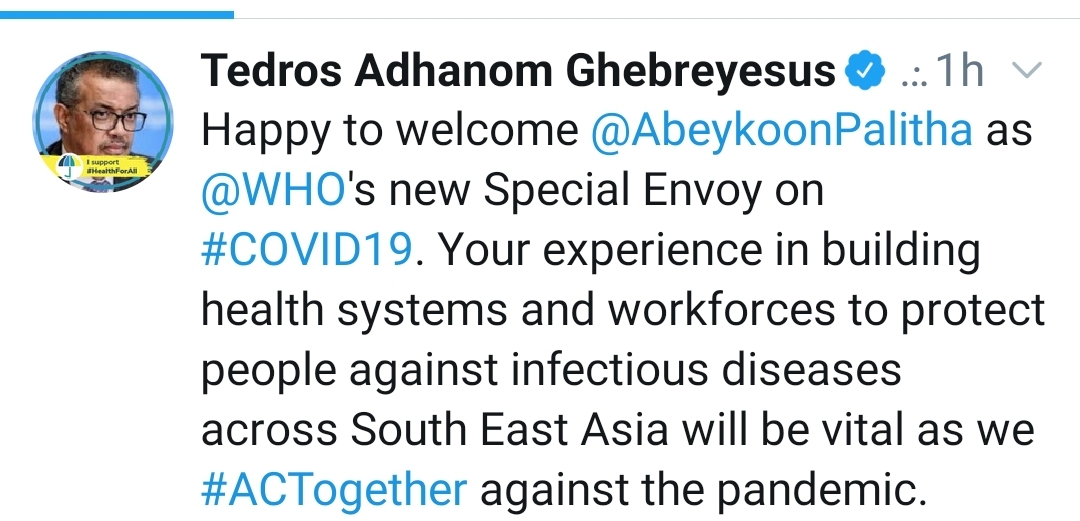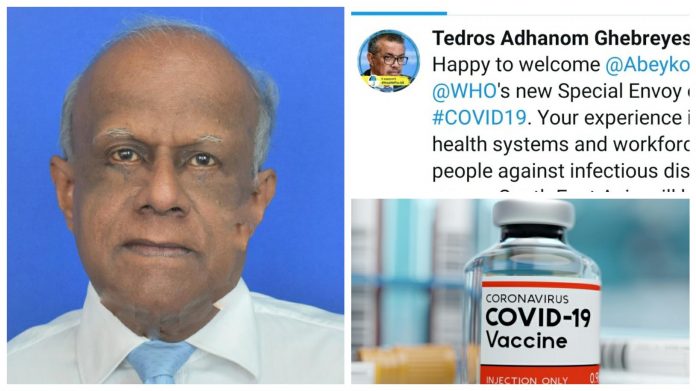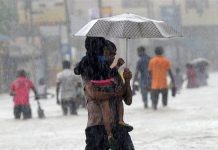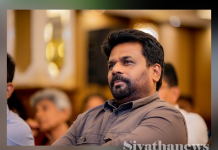Director General of the World Health Organization (WHO) Tedros Adhanom Ghebreyesus has welcomed Dr Palitha Abeykoon, who was appointed as the Organization’s Special Envoy on COVID-19.
Ghebreyesus tweeted that Dr. Abeykoon’s experience in building health systems and workforces to protect people against infectious diseases across South East Asia will be vital to act together against the pandemic.
Dr. Palitha Abeykoon, who serves as a senior adviser to Sri Lanka’s Health Ministry, is the latest member to be appointed by the WHO in addition to the six Special Envoys who were appointed in February 2020.
The Special Envoys are tasked with providing strategic advice and high-level political advocacy and engagement in different parts of the world. They will work in close collaboration with WHO Regional Directors and country offices to coordinate the global response to COVID-19.
The main functions of the Special Envoys on COVID-19 are to amplify the messages of the Director-General; Disseminate WHO guidance on COVID-19 readiness and response; Partake in high-level advocacy and political engagement; Provide strategic advice on preparedness, readiness and response to COVID-19 outbreaks; Engage with regional bodies and national governments; and Report regularly to the Director-General on their work and the situation in countries.

Dr. Palitha Abeykoon has been appointed alongside the following health experts.
1. Professor Dr. Maha El Rabbat, former Minister of Health and Population of Egypt;
2. Dr. David Nabarro, former Special Adviser to the United Nations Secretary-General on the 2030 Agenda for Sustainable Development and Climate Change;
3. Dr. John Nkengasong, Director of the African Centres for Disease Control and Prevention;
4. Dr. Mirta Roses, former Director of the WHO Region of the Americas;
5. Professor Samba Sow, Director-General of the Center for Vaccine Development in Mali;
6. Dr. Young-soo Shin, former Regional Director of the WHO Region of the Western Pacific.
Dr Palitha Abeykoon is a senior physician and public health professional from Sri Lanka, with post graduate education and training from the universities of Geneva and Southern California, and the Harvard School of Public Health, where he was a Taro Takemi Fellow.
He is a Senior Advisor to the Ministry of Health of Sri Lanka, chairs the National Authority on Tobacco and Alcohol, serves on the National Advisory Committee on Communicable Diseases, and is a member of National Medicines Authority of Sri Lanka. A former president of the Sri Lanka Medical Association, Dr Palitha serves as a member of the WHO Global Learning Academy and the Regional Director’s Research Advisory Committee.
In his long career in the WHO, Dr Palitha served as the health workforce advisor in Nepal where he helped to set up the Institute of Medicine, the country’s first medical school, and later in Indonesia where he helped establish the Consortium of Health Sciences and five new schools of public health.
Subsequently, Dr Palitha worked as the WHO South-East Asia Regional Advisor on Human Resources for Health and later was the Director of Health Systems Development. He also served as the WHO Representative to India and led India’s polio eradication effort.
Dr Palitha has been a consultant in health policy and health systems to the World Bank, WHO, UNFPA and DFID in Thailand, Myanmar, the Democratic People’s Republic of Korea, Timor Leste and India. He facilitated the establishment of Myanmar’s first public health university and the blueprint for the Royal Bhutan Institute of Medicine and its baccalaureate program in public health.
He is the recipient of numerous academic awards, the Dr. Fred Katz Award of the Australian and New Zealand Association of Medical Education, the Lifetime Achievement Award from the South East Asia Public Health Education Network, and most recently the Kazue McLaren Leadership Achievement Award of the Asia Pacific Academic Consortium for Public Health.
Dr Palitha has published widely in international journals, written chapters in books in public health and medical education, and most recently was the editor of the History of Medicine in Sri Lanka.
















